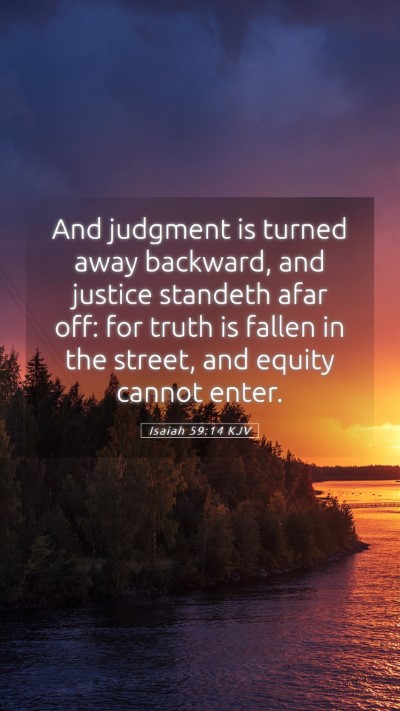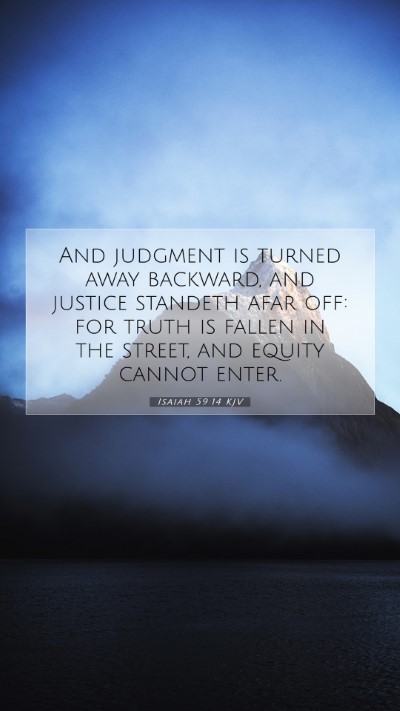Understanding Isaiah 59:14
Isaiah 59:14 states, "And judgment is turned away backward, and justice standeth afar off: for truth is fallen in the street, and equity cannot enter." This verse underlines the moral decay within society and highlights the consequences of turning away from divine principles. The combined insights from various public domain commentaries provide a deeper understanding of this passage.
Bible Verse Meanings
The meaning of this verse can be distilled into several key ideas:
- Moral Inversion: Justice and judgment are depicted as being in reverse; what should be right has become wrong.
- Absence of Truth: The reference to truth falling in the street signifies widespread dishonesty and a failure to adhere to God's teachings.
- Inability to Achieve Justice: The phrase "equity cannot enter" suggests that fairness and integrity are absent in societal dealings.
Bible Verse Interpretations
Matthew Henry emphasizes the gravity of the situation where a society's moral compass has eroded. He articulates that the verse symbolizes a nation that has forsaken God’s laws, leading to chaos and injustice. Albert Barnes elaborates on the implications of judgment being “turned away backward,” suggesting that even the processes meant to uphold justice have been corrupted. Adam Clarke notes that the fallen truth indicates a spiritual crisis, where God’s Word is disregarded in the public square.
Bible Verse Commentary
This verse can be seen as both a condemnation of the present state of Israel's society and a prophetic warning about the consequences of abandoning divine justice.
According to Matthew Henry, the absence of righteousness leads to desperation and despair. He posits that the lack of just judgment results in a collective inability to discern right from wrong, thereby affecting the entire community.
Barnes adds that the consequence of ignoring God’s truth leads society into a downward spiral, wherein the justice system fails to protect the innocent and right the wrongs.
Clarke further interprets this scenario as indicative of a broader spiritual battle within nations, where physical and moral realms are affected by the nation’s spiritual fidelity or lack thereof.
Scripture Analysis and Biblical Exegesis
The analysis of Isaiah 59:14 reveals critical truths about the condition of human society when separated from God. It serves as a tool in biblical exegesis to understand not just the historical context of Isaiah's audience, but also the timeless nature of the moral dilemmas faced by humanity.
Historical Context
In the historical context of Isaiah's time, Israel faced numerous challenges including idolatry, injustice, and a neglect of the vulnerable. Isaiah spoke during a period of impending judgment, where the consequences of sin were beginning to manifest in the social fabric of Israel.
Application to Daily Life
For contemporary readers, Isaiah 59:14 serves as a sobering reminder of the importance of upholding truth and justice in every aspect of life. It compels us to evaluate our own commitments to righteousness and equity in our communities, urging a return to the moral guidelines outlined in Scripture.
Bible Study Insights
In Bible study groups, discussing the ramifications of Isaiah 59:14 can lead to rich discussions on the state of modern society and the church's role in advocating for justice.
Online Bible study tools often highlight this verse when exploring themes of justice, truth, and the consequences of societal decay.
Key Cross References
- Psalm 82:2-4: Speaks to the call for justice among leaders.
- Micah 6:8: Summarizes God’s desires for justice, mercy, and humility.
- Proverbs 14:34: Notes that righteousness exalts a nation, while sin is a reproach to any people.
Conclusion
In summary, Isaiah 59:14 is a profound reflection on the state of societal values when detached from divine truth. Its analysis across various commentaries enriches our understanding and reminds us of the essential principles of justice and truth that should govern human behavior.


